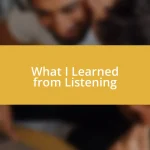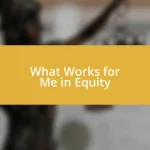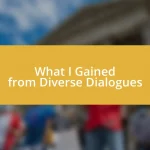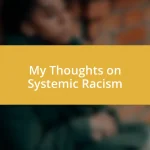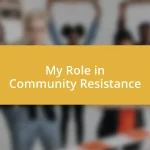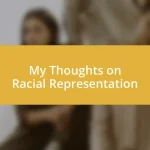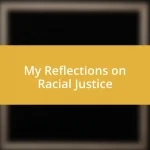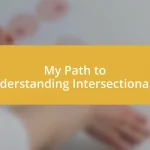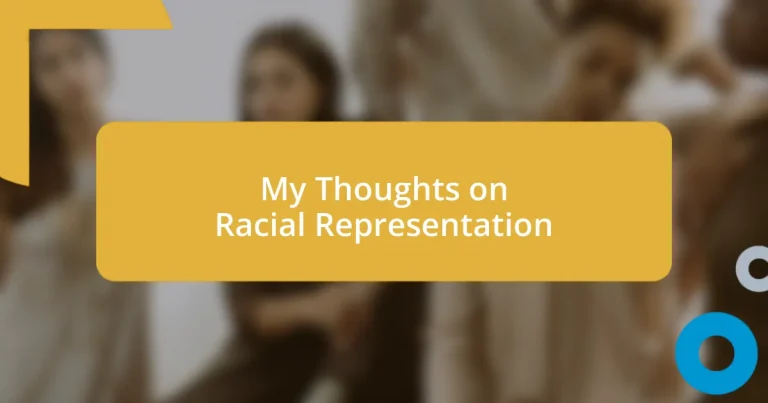Key takeaways:
- Racial representation is crucial for validating individual experiences and fostering a sense of belonging.
- Diversity in media influences self-identity, empathy, and can drive systemic social change.
- Personal experiences with racial diversity enrich understanding and highlight the need to embrace different narratives.
- Educational initiatives and hiring practices that prioritize diversity are essential for improving representation.
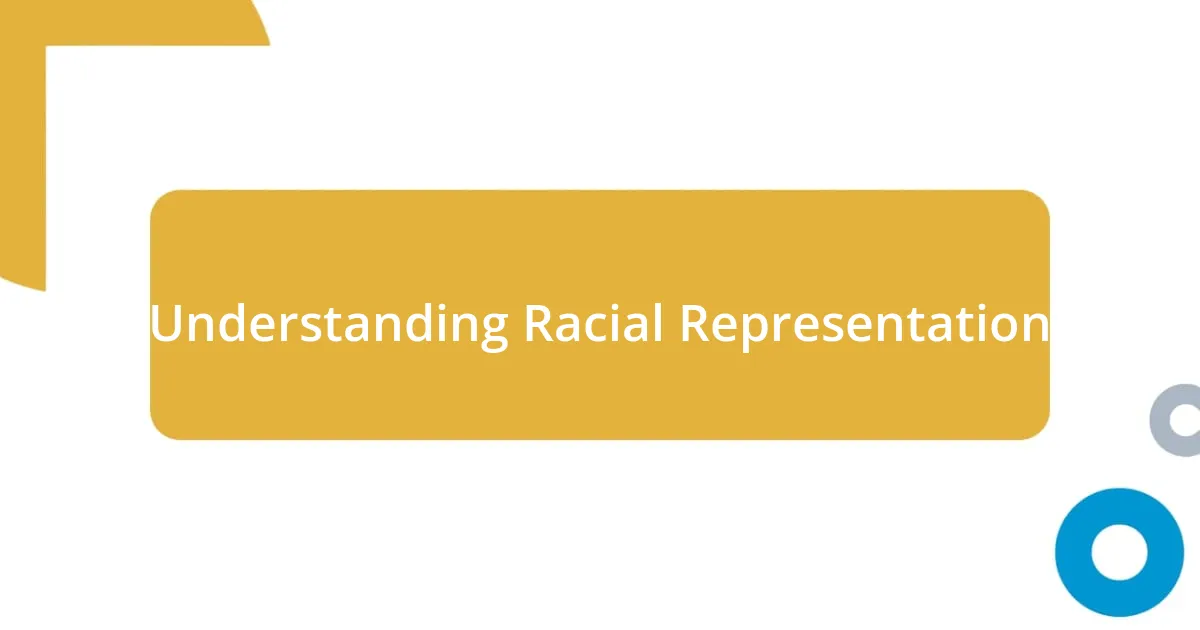
Understanding Racial Representation
Racial representation goes beyond mere numbers; it’s about visibility and acknowledgment in society. I remember watching a popular TV show growing up where I barely saw anyone who looked like me. It made me wonder—did my experiences matter?
When we consider racial representation, it’s essential to understand its impact on identity formation. I’ve seen friends visibly light up when they spot characters in movies that reflect their own backgrounds. It’s as if those stories validate their existence and struggles in ways that words sometimes can’t capture.
Furthermore, genuine representation fosters empathy and understanding among diverse groups. I often think about how a well-represented story can change perceptions. Isn’t it fascinating how a single film can spark conversations that challenge stereotypes and encourage dialogue? This reality highlights the power of representation in shaping a more inclusive society.
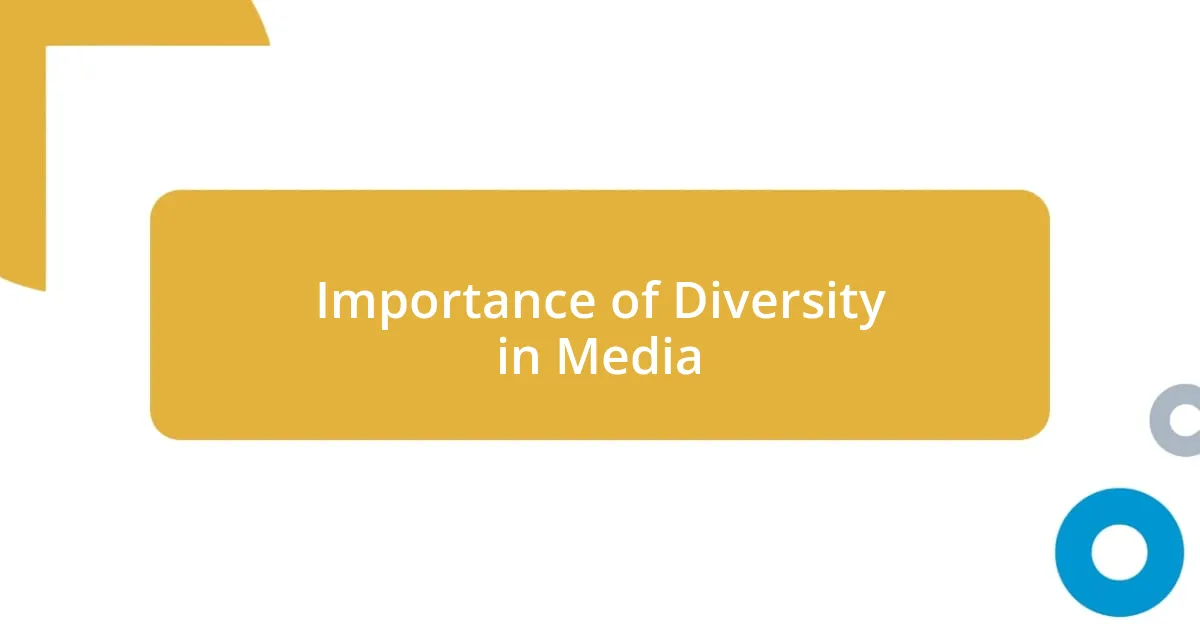
Importance of Diversity in Media
Diversity in media isn’t just a checklist; it directly influences how we view ourselves and others. I can still recall a moment when I stumbled upon an indie film showcasing a multicultural cast. It left me inspired. Seeing talent from various backgrounds resonated with my own experiences and reminded me that our stories matter and deserve a platform.
Media representation doesn’t just shape individual identities; it can also influence systemic change. For instance, a documentary I watched recently highlighted the stories of marginalized communities fighting for justice. I felt a surge of hope; their realities pushed me to engage more actively in social issues. This underscores how diverse stories can mobilize audiences and spark collective action.
Moreover, I believe diversity in media shapes societal norms and perceptions. When I see films or shows that authentically portray different cultures, it broadens my perspective. It’s a reminder that our world is rich with narratives waiting to be told, emphasizing that everyone’s voice holds significance in the grand tapestry of life.
| Aspect | Impact of Diversity in Media |
|---|---|
| Identity Representation | Recognizes various identities and allows individuals to see themselves in stories. |
| Empathy Development | Encourages understanding and compassion, breaking down barriers among groups. |
| Systemic Change | Can inspire movements and actions that address inequities and promote social justice. |
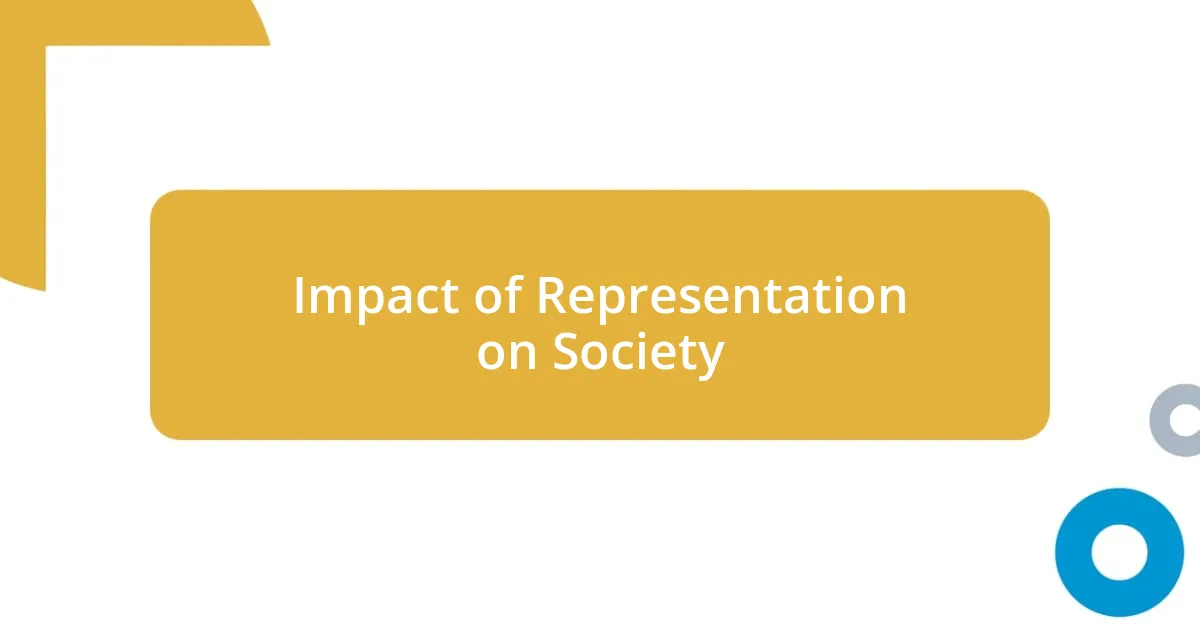
Impact of Representation on Society
Representation plays a crucial role in shaping public perceptions and attitudes. I recall a time at a community event where a speaker shared their journey as a representative of a marginalized group. The powerful impact of their story resonated deeply with everyone present, making individuals rethink their biases and broaden their understanding of equality. It struck me then how essential it is for diverse voices to be heard—these stories can challenge deeply ingrained stereotypes and promote meaningful dialogue within society.
Consider the following points regarding the impact of representation:
- Self-Identification: When people see themselves represented, it fosters a sense of belonging that can be transformative for their self-esteem.
- Social Awareness: Representation opens the door for conversations about identity and cultural differences, allowing us to learn from one another.
- Civic Engagement: Stories of diverse experiences can inspire action within communities, urging individuals to advocate for equity and social justice.
- Cultural Appreciation: Well-rounded representation enriches the collective cultural landscape, helping to dismantle monolithic narratives.
Reflecting on these insights, I feel that society has much to gain by embracing diverse perspectives and celebrating the stories that connect us all.
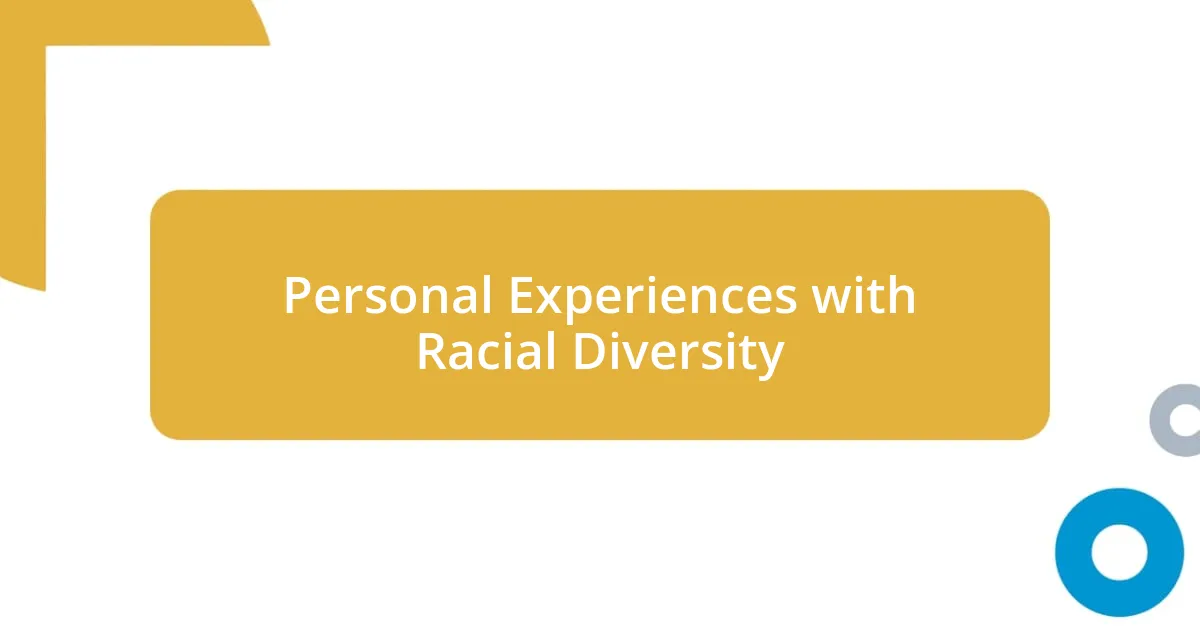
Personal Experiences with Racial Diversity
I remember my first day at a multicultural school. The hallways buzzed with a mix of languages, and I felt a swirl of excitement and nervousness. It was eye-opening to find friends from backgrounds different from mine; we shared stories that painted vivid pictures of our lives and cultures. The exchange of experiences not only enriched my understanding but also fostered a sense of connection that I deeply cherish to this day.
Reflecting on my college years, I joined a club focused on racial diversity, where I encountered powerful narratives that shifted my perception of what diversity truly means. One classmate shared her struggle with identity, navigating life between two cultures. Listening to her stories made me realize how layered and complex each person’s experience can be. It wasn’t just about acknowledging differences; it was about embracing the unique journeys that shape who we are.
Have you ever considered how your own environment influences your views on race? My travels have shown me the beauty of diverse communities. In one city, I participated in a cultural festival where different ethnic groups showcased their traditions through art, dance, and food. The laughter, the joy, and the stories shared that day left a lasting imprint on my heart. It reaffirmed my belief that the more we embrace diversity, the richer our collective experience becomes.
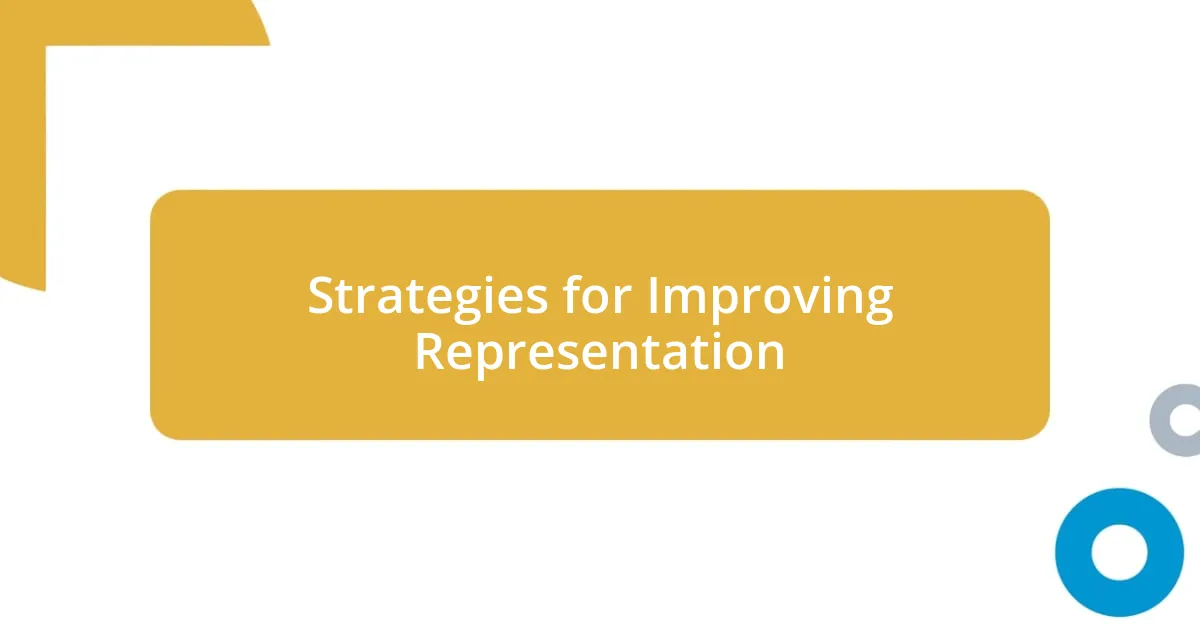
Strategies for Improving Representation
To improve representation, organizations can prioritize diversity in hiring practices. I remember working at a company that made a conscious effort to recruit individuals from underrepresented backgrounds. It changed the office dynamics entirely; we began to see fresh perspectives that sparked innovative ideas and solutions. Just think, how much richer our workplaces could be if everyone felt equally represented?
Educational initiatives are also crucial for improving representation. I once attended a workshop focused on cultural competency, and it completely opened my eyes to the importance of understanding different experiences. The discussions we had made me realize that actively educating ourselves can play a significant role in fostering a more inclusive environment. How often do we invest time in learning about others’ backgrounds? This simple act can challenge stereotypes and build bridges.
Furthermore, media plays a pivotal role in shaping perceptions. I recall watching a documentary highlighting the stories of minority communities, and it struck me how powerful authentic representation can be. When media portrays diverse narratives responsibly, it not only entertains but also informs the broader audience, urging them to recognize the richness of our varied experiences. Isn’t it inspiring to think that stories can truly shift public understanding and empathy?
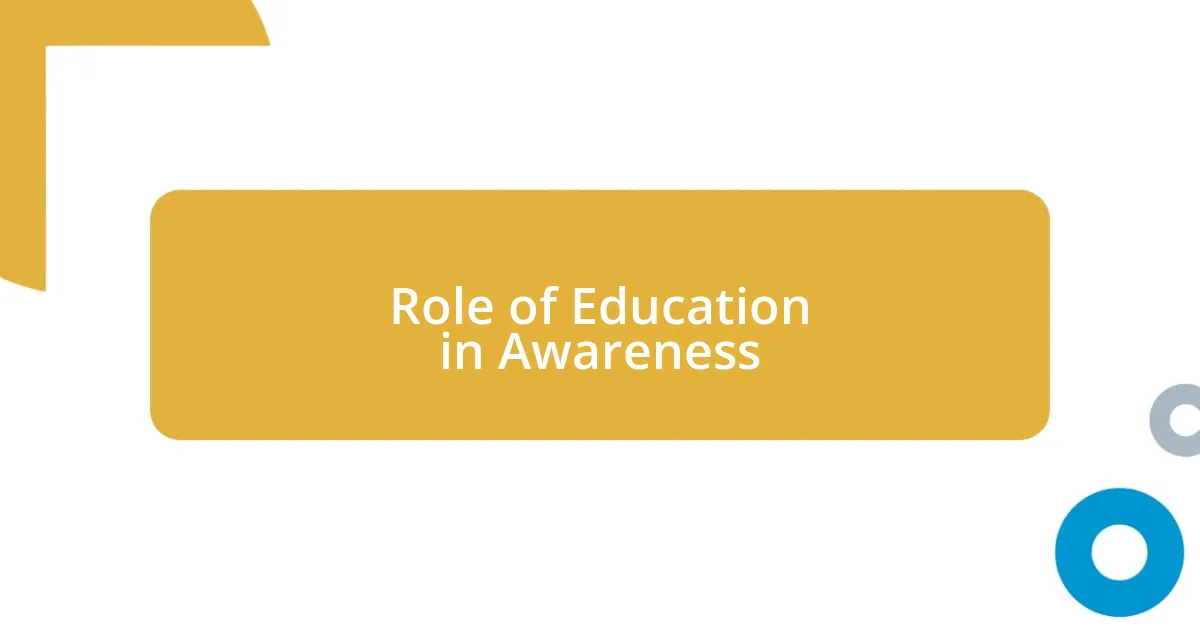
Role of Education in Awareness
Education serves as a crucial bridge in promoting awareness about racial representation. I can recall attending a high school history class where we discussed systemic inequalities; it felt empowering to connect the dots between past events and present realities. This kind of dialogue not only expanded our knowledge but also fostered empathy among students as we began to see each other’s experiences through a more informed lens.
While studying at a university, I joined a course that focused heavily on social justice issues. We were assigned a project that required us to research the impact of racial representation in various media. I remember the frustration I felt when I discovered how underrepresented certain groups were in films and literature. Analyzing this disparity revealed the gaps in narrative and representation, deepening my desire to advocate for change. Isn’t it fascinating how education can ignite such passion in us?
It’s essential to recognize that education is not just confined to classrooms. I often think about informal learning opportunities, like community workshops or book clubs, that delve into racial issues. Participating in one such discussion opened my eyes to the significance of storytelling in shaping collective awareness. Listening to someone share their personal struggles made me realize that education is an ongoing journey—it’s about being open to learning from those around us and actively engaging in conversations that challenge our understanding. Isn’t that the essence of awareness?

